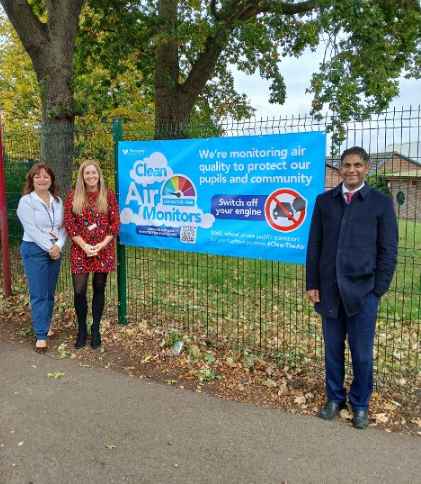Birmingham City Council is celebrating National Walk to School month this October with a new campaign highlighting the issue of air quality around the city’s schools.
#ClearTheAir builds on the initiatives such as the Modeshift STARS programme that are already being delivered in schools, encouraging parents and pupils to walk or use public transport to travel to and from school, and addressing the issue of idling engines during pick-up and drop-off. At the heart of the #ClearTheAir campaign are innovative air quality monitors installed outside schools, providing real-time data that reveals the stark impact of car-heavy school runs and idling engines.
Delivered in partnership with EarthSense, the UK’s leading manufacturer of air quality products, over 130 Zephyr sensors have already been installed onto the exterior façades of primary and secondary schools across the city to support the Council’s commitment to raising awareness of the causes of air pollution, and the steps that can be taken to reduce emissions and exposure. All schools in the Birmingham area that sign up to the Air Quality Monitoring Programme will receive a free air quality sensor, provided by Birmingham City Council, and associated resources and support.
In addition, an EarthSense sensor is being co-located at the Council’s Ladywood Air Quality Station to allow comparison of the results with existing monitoring equipment. The results captured by the sensors will be made freely available to the public via a portal which will host downloadable factsheets with easy-to-understand data analytics, highlighting key metrics, as well as notifications of other Birmingham City Council air quality initiatives and events.
#ClearTheAir was officially launched at The Deanery Church of England Primary School, which is setting a strong example in sustainable travel and environmental awareness, having earned a Good Level Modeshift STARS accreditation for its proactive approach. Over the past academic year, the school has introduced a series of impactful initiatives aimed at reducing car use and improving air quality around the school site, using its two EarthSense sensors to track results.
These include the launch of a ‘Park and Stride’ scheme to encourage families to walk part of the journey to school, the organisation of regular walking events, and the innovative use of an outdoor classroom as a sheltered waiting area for parents. Councillor Majid Mahmood, Cabinet Member for Environment and Transport at Birmingham City Council, said: “Through their participation in programmes such as Modeshift STARS, underpinned by data from EarthSense sensors, schools like The Deanery are leading the way when it comes to educating students and parents alike of the importance of good air quality.
“The benefits of walking to school are self-evident, but this campaign also focuses on the issue of idling car engines. Leaving your car engine running whilst stationary for just one minute releases enough exhaust fumes to fill 150 balloons with harmful pollutants.
“By simply switching off the car engine while waiting, parents and carers could be helping to protect the air children breathe every day.” Speaking about the ongoing installation of monitors in schools, Owen Gardner, Chief Operating Officer at EarthSense, added: “We are delighted to be collaborating with Birmingham City Council on this major UK project, aimed at capturing real time air quality pollution data across the city.
“This data will enable the Council to direct measures that will reduce the pollution levels for all residents, but particularly, schoolchildren, their parents and families in these key areas.” You can find out more about Birmingham City Council’s work to reduce emissions at the school gates, including the Modeshift STARS programme, on their website.
